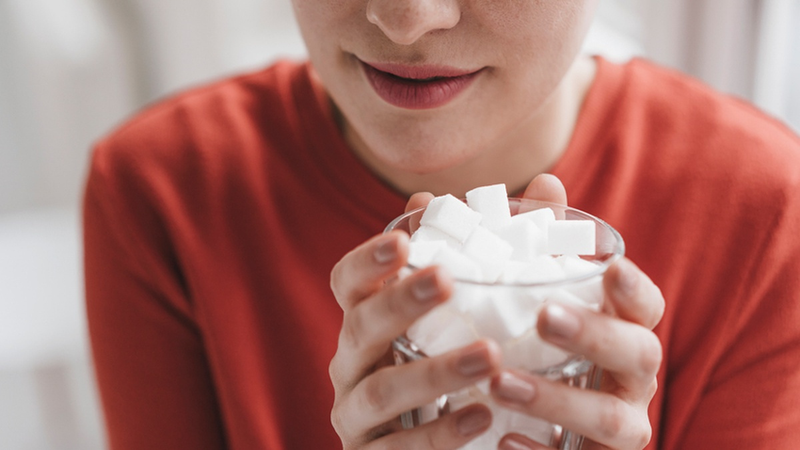Sugar not only causes acne, it also accelerates skin aging, causing wrinkles and loss of firmness. Research shows that excess glucose in the blood breaks down collagen and elastin, making skin look less youthful. But is sugar really the enemy of your skin, or are there other factors that contribute to skin deterioration?
Most articles on skin care warn that sugar is the leading cause of acne and accelerates the aging process. However, is sugar really the enemy of the skin? This article will help you answer questions and better understand the effects of sugar on the skin, let’s find out now!
Is sugar really the enemy of the skin?
According to research, there are 3 common types of sugar and they can all have negative effects on the body if consumed in excess. Of which, glucose, often found in starch and bread, is metabolized the fastest by the body, causing blood sugar levels to increase. Fructose (sugar from sugar cane, beets, or corn) or fruit sugar does not have much impact on blood sugar but can cause weight gain and hormonal disorders because the liver has to take on the task of metabolizing it. Sucrose (white sugar) is a combination of glucose and fructose, which is the type of sugar we consume every day.

Foods containing refined sugar can be harmful to the skin.
According to nutritionist Anupama Menon, if you consume sugar from natural sources such as fruits (apples, pineapples), sugarcane or honey in reasonable amounts, it will have less negative effects on the body. These foods not only provide sugar but also supplement minerals and enzymes to help the body function effectively. At the same time, dermatologist Harold Lancer said that the glycemic index also plays an important role. Foods with a low glycemic index such as kiwi, blueberries or raspberries help control insulin and slow the increase in blood sugar, in contrast to foods like watermelon, which have a high index.
What really harms the skin is foods containing refined sugar – a type of sugar that provides a lot of calories but does not come with nutrients. For example, bread already contains natural sugar, if refined sugar is added, the body will absorb excess. It is this unnecessary amount of sugar that makes sugar a “culprit” that affects skin health.
However, when used topically, sugar plays a positive role. With its natural moisturizing properties, sugar helps to attract moisture from the environment and lock it into the skin. Therefore, skin care products containing sugar or sugar derivatives can help hydrate, keeping the skin soft and hydrated effectively.
Other “culprits” of the skin besides sugar
When ordering milk tea, you can choose the “less sugar” or “30% sugar” level to reduce the sweetness. This makes sugar often blamed for skin problems. However, a cup of milk tea does not only contain sugar, but other ingredients such as cow’s milk or milk powder also contribute to the harm. They can lead to hormonal acne or skin irritation that many people often do not pay attention to.

Foods with a high glycemic index like white bread can also be harmful to the skin.
Dermatologist Joshua Zeichner believes that foods with a high glycemic index such as white bread, white pasta or potatoes are also “culprits” that harm the skin. These foods not only make the skin prone to acne but also accelerate the aging process of the skin. However, the problem lies in the fact that we consume too much sugar, turning it into a “culprit” when it is only really harmful if used excessively.
In addition, some manufacturers cleverly hide the amount of sugar in their products under many different names. Ingredients such as syrup, nectar or substances ending in “-ose” can all be forms of sugar. In fact, sugar now appears under more than 50 other names, making consumers mistakenly think that they have reduced sugar in their diet, when in fact it is the complete opposite.
How to satisfy your sweet tooth while still maintaining beautiful skin?
To enjoy your favorite sweet taste while maintaining healthy skin, it is best to prioritize foods with natural sugars and consume them in moderation. Fruits, honey or sugar cane not only provide natural sweetness but also contain nutrients and enzymes that are good for the body. If you maintain a balance and do not consume too much, they will have less negative effects on the skin. In addition, you should limit refined sugar, especially foods containing added sugars such as candy, carbonated drinks or processed foods. According to experts, the amount of added sugar should be limited to 25 – 38 grams per day depending on gender. Controlling the amount of sugar intake not only helps protect the skin but also supports overall health.

Limit foods containing added sugars such as candy and carbonated drinks.
In addition to diet, beautiful skin also depends on many other factors such as proper skin care, limiting exposure to UV rays and environmental pollution, ensuring enough sleep and reducing stress. Therefore, to satisfy your sweet tooth while maintaining radiant skin, balance all habits and move towards a healthier lifestyle.
Although sugar is often considered the “enemy” of the skin, this is not the case. The problem is not in the sugar itself but in the way we consume it. When using sugar from natural sources in reasonable amounts, combined with a scientific skin care regimen and a healthy lifestyle, the skin can still maintain its radiant beauty. Instead of completely avoiding sugar, learn how to use it wisely to satisfy your personal preferences while protecting your health and skin.





